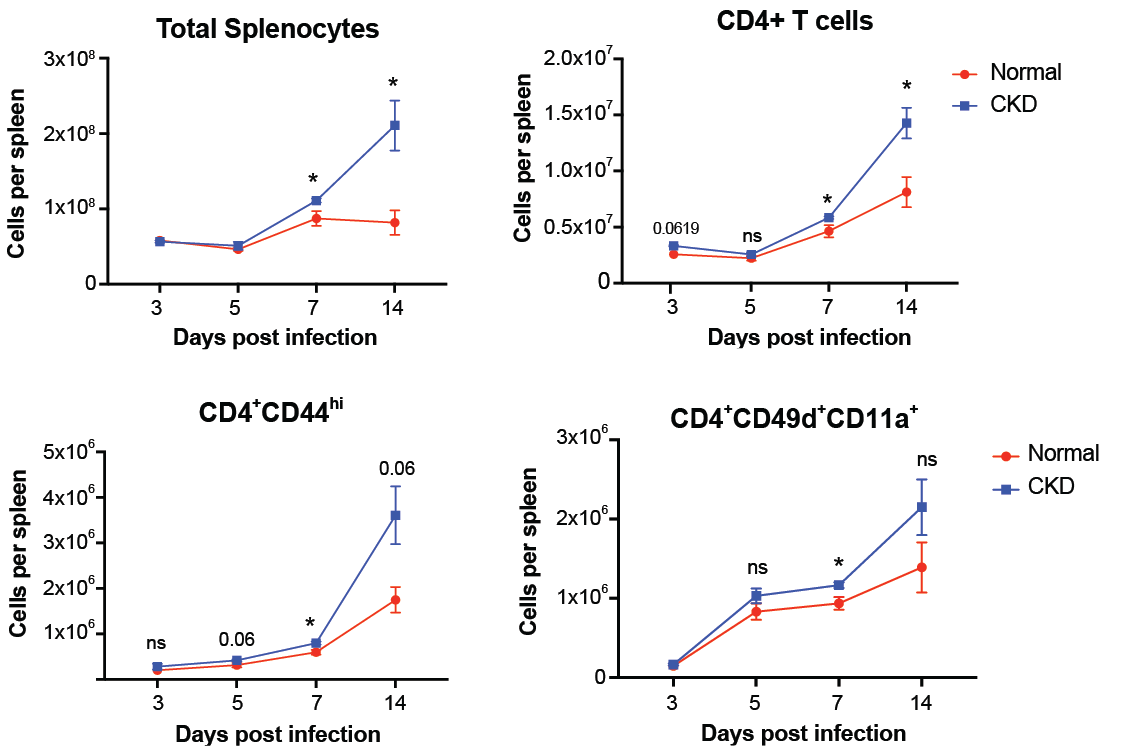The Effects of Chronic Kidney Disease on Antiviral T Cell Response
1Emory Transplant Center, Atlanta, GA, 2Pediatrics, Emory University School of Medicine, Atlanta, GA, 3Microbiology & Immunology, Emory University School of Medicine, Atlanta, GA
Meeting: 2019 American Transplant Congress
Abstract number: D53
Keywords: Cytomeglovirus, Infection, Mice, T cells
Session Information
Session Name: Poster Session D: Tolerance / Immune Deviation
Session Type: Poster Session
Date: Tuesday, June 4, 2019
Session Time: 6:00pm-7:00pm
 Presentation Time: 6:00pm-7:00pm
Presentation Time: 6:00pm-7:00pm
Location: Hall C & D
*Purpose: Accumulation of memory T cells bearing markers of sustained antigen stimulation have been described in patients with chronic kidney disease (CKD). Cytomegalovirus (CMV) establishes a persistent infection that has also been implicated in driving terminal differentiation of T cells in humans. Furthermore, persistent CMV viremia post-transplant is associated with deterioration in kidney graft function. However, mouse models of protective and alloimmunity are typically studied in young, naive animals without chronic disease or infection. We aimed to determine whether CKD alters the T cell repertoire in mice and influences T cell response during acute CMV infection.
*Methods: CKD was induced in male 129X1/SvJ mice through five-sixths nephrectomy in a two-stage surgery (n=20). Age-matched mice (n=12) served as controls. At 8 weeks, mice were then infected with 106 PFU of murine CMV (K181 Bac strain) via intraperitoneal injection. Splenocytes were collected on days 3, 5, 7, and 14 post-infection and stained for surface markers of antigen experience (e.g. CD44, CD49d, CD11a and CMV tetramers). Intracellular cytokine staining for IFNg, TNF, and IL2 was performed after ex vivo stimulation with viral peptides (M38, M45, and M139).
*Results: Mice with CKD experienced increased splenomegaly during CMV infection as measured by total splenocyte count (Fig.1) and spleen weight. This was driven not by CD8+ T cells which expanded to a similar degree as normal mice. Rather, we observed increased total CD4+ T cell counts (Fig.1) resulting in an increased CD4:CD8 ratio at day 14. CKD mice also had increased CD4+ T cells expressing markers of activation (CD44hi) and antigen experience (CD49d+CD11a+) over time post-infection compared to normal mice (Fig.1). However, there was no difference in the expansion of antigen-experienced or mCMV-specific CD8+ T cells between CKD and normal mice. At the peak of T cell response on day 7 post-infection, CKD mice had lower frequencies of IFNg positive CD4+ T cells in response to ex vivo stimulation with viral peptides. No difference was observed in the frequency of IFNg-producing CD8+ T cells.
Figure 1. Kinetics of absolute T cell counts during CMV infection in mice with and without CKD.
*Conclusions: Although CKD mice had increased number of activated CD4+ T cells during CMV infection, their function appears altered compared to normal mice, suggesting immune dysregulation in response to infection during CKD. The impact on viral control is currently being evaluated.
To cite this abstract in AMA style:
Crepeau RL, Li H, Daley-Bauer LP, Ford ML, Winterberg PD. The Effects of Chronic Kidney Disease on Antiviral T Cell Response [abstract]. Am J Transplant. 2019; 19 (suppl 3). https://atcmeetingabstracts.com/abstract/the-effects-of-chronic-kidney-disease-on-antiviral-t-cell-response/. Accessed February 22, 2026.« Back to 2019 American Transplant Congress

